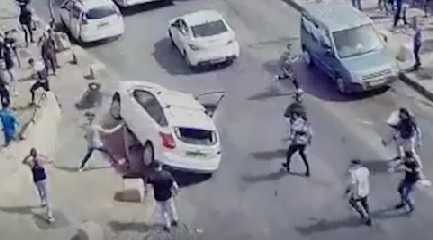
12 August 2022; MEMO: An Israeli settler rammed his car into Palestinian activist Bayan Al-Tabib on Thursday evening during a peaceful protest against settler and army attacks against Palestinians. The attack took place on a main road linking the cities of Nablus and Jenin in the Israeli-occupied northern West Bank, Anadolu has reported.
According to an activist in the Popular Resistance Committees, Khairy Hannoun, the victim of the attack had a foot amputated at a local hospital after the attack. Al-Tabib is a member of the Fatah Revolutionary Council and was unable to get out of the car's way in time.
"Dozens of settlers gathered to attack the Palestinian protesters and seize Palestinian flags," explained Hannoun. "The [Israeli] soldiers also attacked the Palestinians, even though they were the victims. Soldiers fired gas and stun grenades at them, which led to breathing problems for some."
The peaceful protest had been called by Fatah, the Popular Committee against the Wall and Settlements, the National Action Committees and local committees in response to the repeated attacks by the occupation army and settlers against the local Palestinians. All Israeli settlers occupy Palestinian land illegally under international law.
According to the UN, Jewish Israeli settlers have carried out 380 attacks against Palestinians and their properties since the beginning of this year. At least 81 Palestinians have been injured in the attacks, and just under 300 properties have been damaged.
Also on Thursday, hundreds of Palestinians in the town of Idna, near Hebron in the southern West Bank, participated in the funeral of an elderly Palestinian woman who died in an Israeli prison last month. Saadia Faraj-Allah was 68 and a mother of eight. She died in Israel's Damon Prison on 2 July after her health deteriorated. The Israeli occupation authorities delayed the handing over of her body for burial, said the Palestinian Prisoners' Club.
Israel is holding more than 4,500 Palestinian prisoners, including 27 women and 160 children. Around 600 of the prisoners have serious illnesses but don't receive adequate treatment from Israeli prison doctors.




